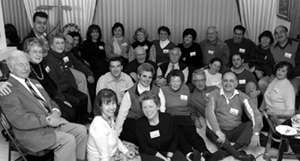Europe Could Produce Enough Wind Farm Energy to Power the Whole World for 30 Years, New Study Shows
This exciting new study from the University of Sussex shows that Europe alone could feasibly produce enough wind energy for the entire Earth.

Palestinians and Jews have finally found a place where they can safely meet and listen to each other's grievances and understand each other's pain while in the same room — a living room.
As their governments grapple with suicide bombers and military invasion, 40 groups of Palestinians and Jews are building relationships of caring and mutual respect in living rooms across the US and the Middle East, with the goal of building trust between peoples who have rarely known each other.
Israelis have told Len and Libby Taubman, who started the first Living Room Dialogue Group 10 years ago in San Mateo, CA., "I never knew a Palestinian in all the years I lived in Israel." During the 192 monthly meetings held in the Taubman's living room since 1992 the 30 Jewish and Arab participants have become close friends.
"What war is about is lack of communication. It is both sides trying to be heard and not being listened to," insists Libby, " and that's what we do in Living Room Dialogue. Dialogue is not conversation, or debate. It is open listening to the other person's narrative or story."
Taubman explains how frustrations are eased through the dialogue. "Especially for our Palestinian friends from Ramallah. They have families there. Some of them have had their houses broken into by Israeli soldiers and they've been locked in their bathrooms for hours. So, coming here and getting to express it in the group — and educate all of us — helps. It has become a support group. People are feeling very depressed, angry, or fearful." But the most significant benefit of Dialogue Groups is when members speak up back in their own communities, showing support for both sides.
"Right now you can see everybody is choosing sides and if you're not on my side, you're a traitor — and that is going nowhere. Being for only one side and shaking your fist is not solving the problem. Until we can want the best for each other, understand the needs of both peoples that are unique to them, be for both peoples equally… nothing is going to be resolved." One of their stated goals is to wake up the American public and their representatives to realize there are two narratives and suggest that before they lobby for one side they need to hear both peoples' stories. Then, the U.S. can be in a better position to be the peace broker.
How can they hold meetings when things back home are deteriorating?
Everybody tells Libby, " ‘This is where I experience hope.' We see what is possible" She points out that there are reasons for hope because of things like the more than 400 refuseniks in the Israeli Defense Force who are refusing to serve in the occupied territories, because of the peace rally in Tel Aviv — the first one in a long time — that drew 60-100 thousand demonstrators, because of the Saudi peace proposal, because of the 1000 phone calls flooding a New York radio station after a story about a Brooklyn dialogue group, because there is a long waiting list of people who want to join their own group, and because the Palestinian people — like the Jewish people — are a very determined and resilient group. "They are kind of mirror images of each other… cousins going back to Abraham!"
Visit website for the Livingroom Dialogue Groups.
MULTIPLY THE GOOD: Share This on Social Media…
Be the first to comment